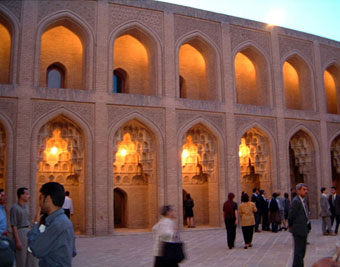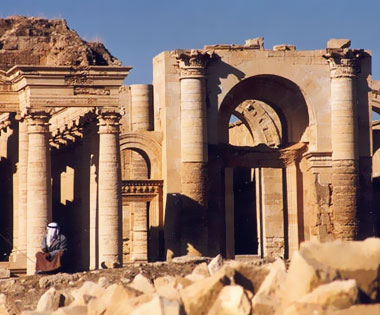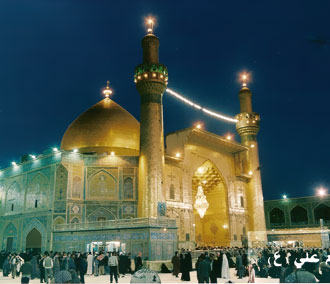Iraq
Country statistics

Land area: 167,556 sq miles (433,970 sq km)
Population (2010 est.): 67,037,517 (growth rate: 0.9%); birth rate: 17.3/1000; infant mortality rate: 34.6/1000; life expectancy: 71.4; density per sq km: 40
Capital City: Baghdad
Monetary unit: U.S. dollar
Languages: Arabic (official), Kurdish (official in Kurdish regions), Assyrian, Armenian
Ethnicity/race: Arab 75%-80%, Kurdish 15%-20%, Turkoman, Assyrian, or other 5%
Religions: Islam 97% (Shiite 60%-65%, Sunni 32%-37%), Christian or other 3%
Country introduction

In the capital of Baghdad, there is a striking contrast between the new buildings and the shabbier back streets. The Government aims to preserve the city's Islamic character by protecting the ruins of historic buildings such as the Ike Abbasid Palace. Long-established markets still trade. The Iraqi Folklore and Modern Art are well represented. The River Tigris is a central feature of the city.
South of the capital is Babylon, the great city once ruled by the Semitic King Hammirabi. The city, and particularly the famous Hanging Gardens, are now being restored. Iraq is rich with history and bustling with artistic artefacts.
The culture

In ancient times the land we now know as modern Iraq was called Mesopotamia, meaning the "land between rivers". The two rivers were Tigris and Euphrates, and the Mesopotamian plain was called the Fertile Crescent. Today, the Tigris and Euphrates river join to flow into the Persian Gulf. This whole region is known as the Cradle of Civilization, as it was the birthplace of numerous early civilizations, including Sumer, Akkad, Babylonia, and Assyria. It declined in importance after Mongol invaders destroyed its extensive irrigation system in 1258 AD.
Iraq is home to Muslims and as such have contributed and influenced the wide spectrum of Iraqi culture.
Tea houses are commonly scattered over Iraq, and in the afternoon it is a habit for shopkeepers to retreat into the back with a close circle of friends to sip tea over gossip, an Iraqi "siesta".
Rites of passage are mainly centered on children being schooled enough to correctly read the Quran, quite the challenging task. The Quran is perhaps one of the hardest texts to read, both because of depth of meaning and due to the difficult range of sounds Arabic demands from the human vocal cords. The child with least pronunciation errors is called the "hafiz" or "memorizer". There is usually a large celebration in the child's honor.
Marriages and births are enormous parts of Iraqi life. It is common to have hundreds of people attend weddings. Although there are some arranged marriages, a couple must agree before entering into it, and there are very low divorce rates in Iraq, though it is acceptable and fairly easy under Islamic doctrine.
Generosity is highly valued in Iraqi culture, and it is seen as rude to snub someone asking a favor. This is heightened especially during the month of Ramadan, when it is necessary to give zakat or donations to the poor. Many families, rich and poor alike, cook for the homeless, or even invite them to dinner. Some prepare plates of baklavah or a dish of kebob to take to them.
Attractions & landmarks

Iraq is a beautiful ancient country that now lies in ruins after the brutalities of war, but there are still many areas that are rich with the country's glorious history.
Babylon, located just south of Baghdad is a famous ancient city of significance to the whole world. It features prominently in a number of biblical stories and is associated with the Tower of Babel, which may have referenced the city's largest ziggurat (form of a terraced step pyramid). It was also home to the Hanging Gardens of Babylon, one of the seven ancient wonders of the world, and home to Nebuchadnezzar II (circa 600 BC), also of biblical fame. Babylon was renowned for its high, well-fortified walls and for the magnificence of its temples and palaces.
Hatra, the fortified city of the Parthian Empire, contains examples of Eastern decoration as well as Greek and Roman architecture. These incredibly well preserved Parthian city off in the desert are quite possibly Iraq's most magnificent ruins
The National Museum of Iraq offers a unique museum experience. The museum has a collection of ancient manuscripts and historical relics that can be viewed as well as allowing visitors to learn more about the history of Iraq.
Two of Iraq's important religious buildings are the Mosque of Iman Ali in Najaf near Kufa and the shrine of Iman El-Hussein Ibn Ali in Karbala. Modern buildings of note are the Baghdad Conference Palace, the Khulafa Central Mosque and the National Film Center.